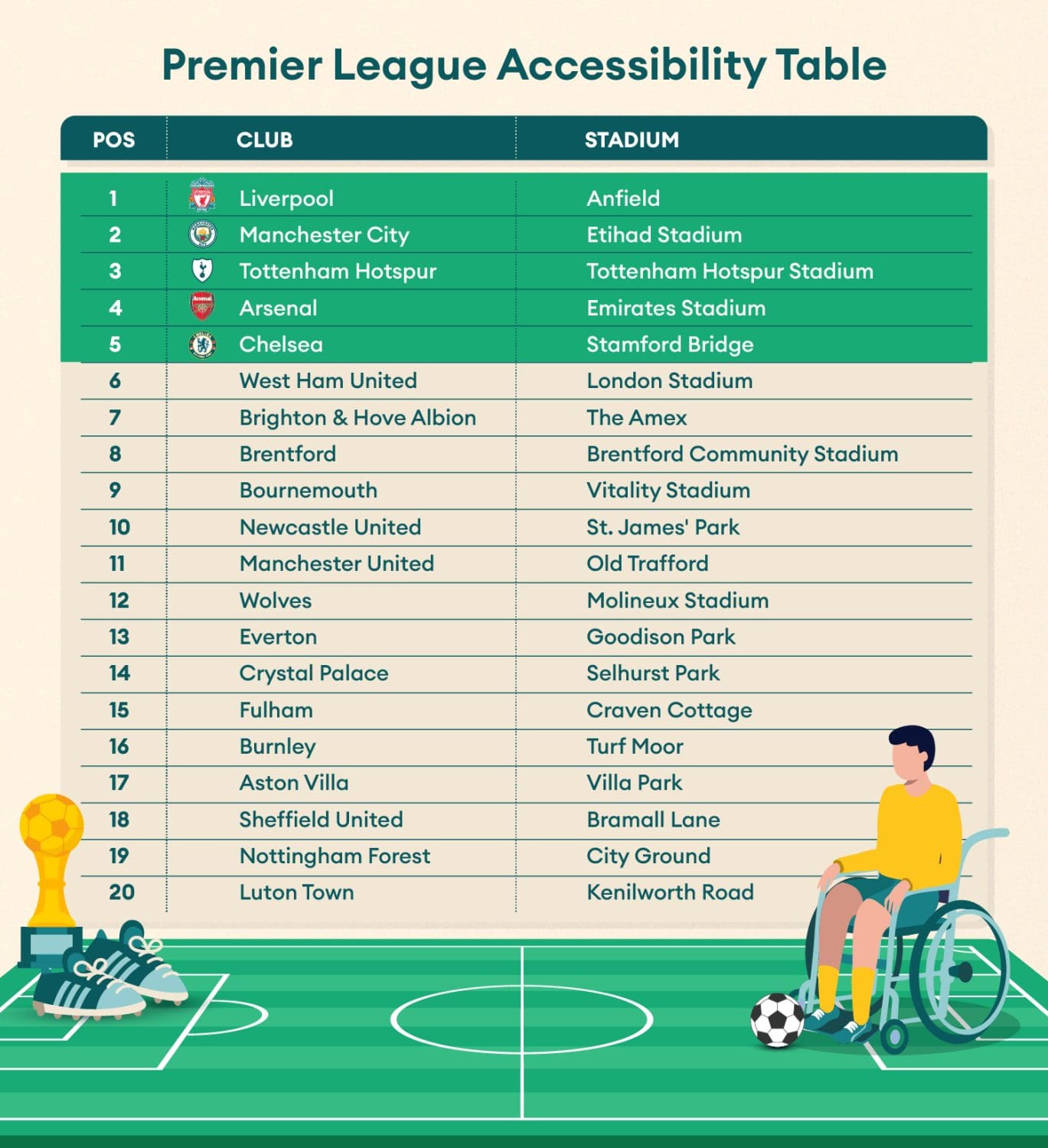Man Utd has come out mid-table in research around Premier League access for disabled people. However, this masks bigger problems in terms of football’s overall accessibility – not least in terms of chronic illness, but also poverty for disabled people.
Man Utd: mid-table for disabled people
Oak Tree Mobility is a disability adaptation and aid company. But it also does research into disability access. It’s looked at just how accessible all 20 Premier League clubs are for disabled people – and the results are a mixed bag. The company based its research on multiple criteria. These included:
- The number of wheelchair-accessible seats relative to capacity. Accessible Stadia Guide’s recommends for a 40,000 capacity stadium, there should be 210 wheelchair accessible spaces, with an additional two per 1,000 seats.
- The number of accessible toilets.
- Provision of audio description services.
- On-site blue badge parking.
- Sensory rooms for fans with specific needs.
Oak Tree Mobility also factored in fan-submitted ratings of “away days” to capture the overall experience for travelling fans. It then gave clubs a score out of 110. The results showed Liverpool came out top – while all three teams newly promoted to the Premier League – Burnley, Sheffield United, and Luton Town – were in the bottom six:

Perhaps surprisingly, Man Utd came in at 11th. Oak Tree Mobility gave it 68 points in total; 27 points behind the club’s Man City rivals. However, it’s not the first time Man Utd has shown to be not fully accessible for disabled people. As the Telegraph reported, disabled fans were furious after an ‘oversight’ at the start of the 2022/23 season meant accessible seats weren’t available.
Plus, Man Utd being accessible is a relatively new thing. A Telegraph investigation in 2017 found the club was not complying with the Accessible Stadia Guide’s recommended quota. In the end, Man Utd had to invest to make changes.
Accessibility for chronic illness: bottom of the league?
All this comes amid the Premier League failing to meet a commitment it made over accessibility. As Oak Tree Mobility wrote:
In 2015 a pledge was made by the Premier League to Accessible Stadia Guide stating that all participating clubs would achieve compliance by August 2017. Despite these promises, suitable wheelchair-user spaces have actually fallen in the last five years.
As a result of failure to meet this pledge, disabled supporters have voiced their hesitance to attend future matches. In addition to limited seating and other accommodations, disabled fans have even experienced abuse from other fans.
However, there are two other issues with accessibility to the Premier League. What much of the Accessible Stadia Guide fails to consider are chronically ill disabled people. For example, many people living with genetic, or chronic, diseases or illnesses have “energy-limiting conditions” (ELCs); that is, as the Business Disability forum wrote:
reduced physical and cognitive energy levels
For example:
some people will feel physically exhausted after having a shower. This may mean they need rests between washing and dressing.
However, in terms of Premier League clubs like Man Utd there is little done to make attending matches easier for these people – like queue jumping. This is not confined to the Premier League, though – as it’s an issue across society. One in three chronically ill and/or disabled people live with an ELC. Yet laws, workplaces, public services, and policies do not account for them.
Then you then have specific chronic illnesses. Postural orthostatic tachycardia syndrome (PoTS) is a condition where the heart beats too fast when a person goes from laying or sitting to being upright. This can cause people to feel sick, faint, and have severe headaches. One of the ways a person can alleviate the symptoms is to elevate their legs.
However, Premier League clubs like Man Utd make no provision for this. Of course, nor does wider society – as putting your feet up on a chair in a public space is still viewed as a social faux pax.
The real accessibility issue: poverty and classism
So, disability access in the Premier League is still lacking. Clubs’ provisions for chronically ill people are often non-existent. However, the biggest barrier for chronically ill and disabled people to watching top-flight football is still the cost.
A Man Utd season ticket for 2023/24 comes in at over £1,000. For many people, this cost is extortionate and reeks of classism. However, for many chronically ill and disabled people too it is well beyond their reach. When working-age disabled people are twice as likely to live in poverty, and more than half of foodbank users are disabled – then getting to see a Premier League football match is a no-no.
The poverty rate for disabled people is well above the national average. Half of all people in poverty are either disabled or carers to them. So, while Premier League clubs like Man Utd are failing to meet basic stadium accessibility, it’s the thin end of the wedge when countless chronically ill and disabled people couldn’t afford to get through the turnstiles in the first place.
Additional reporting via Blue Array SEO
Featured image via Sky Sports Premier League – YouTube















